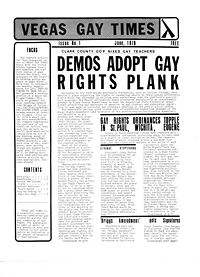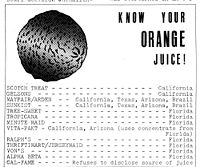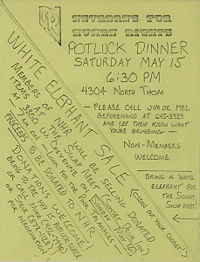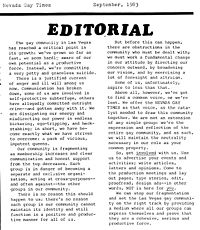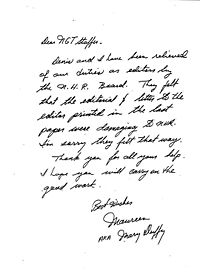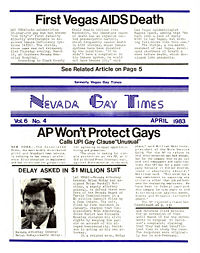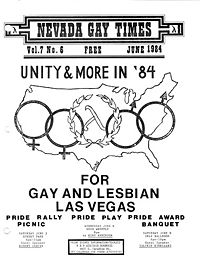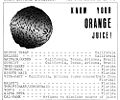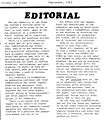Difference between revisions of "Nevadans for Human Rights"
m |
m (→Growing Pains) |
||
| Line 33: | Line 33: | ||
Outwardly, NHR seemed at last to have inspired the cooperation and cohesion Las Vegas' gay community needed to become a serious political force. But there were flaws which eventually brought the organization down. Factions developed within NHR among different groups of people who had different ideas for the organization’s development based upon their involvement in gay communities elsewhere. Contention grew between the men and women, each accusing the other of being exclusive and cliquish. The NHR board also began meddling with the paper's content--exerting censorship Lamont Downs would not tolerate. When David Cohen wrote an editorial pointing out that the women's complaints about male domination of the ''Nevada Gay Times'' was their own fault because they wouldn’t attend production meetings or write stories, the board president stopped publication of the paper until the editorial was removed. Downs and Cohen resigned. At about the same time NHR treasurer Michael Warhurst became editor of the ''Nevada Gay Times'' — and promptly ran off with the organization's money. Because both the Metropolitan Community Church and the Gay Academic Union at the university kept their money in NHR's account, those organizations were left penniless as well.<ref name="ref12">Downs interview; Fonfa interview; Lawrence interview; Mackey; DeLand interview; Maureen Mackey, interview by Dennis McBride, January 10, 1998 [UNLS transcript HQ75.6 U52 N36 1998]; McBride journals, August 11, 1983 [author’s collection].</ref> | Outwardly, NHR seemed at last to have inspired the cooperation and cohesion Las Vegas' gay community needed to become a serious political force. But there were flaws which eventually brought the organization down. Factions developed within NHR among different groups of people who had different ideas for the organization’s development based upon their involvement in gay communities elsewhere. Contention grew between the men and women, each accusing the other of being exclusive and cliquish. The NHR board also began meddling with the paper's content--exerting censorship Lamont Downs would not tolerate. When David Cohen wrote an editorial pointing out that the women's complaints about male domination of the ''Nevada Gay Times'' was their own fault because they wouldn’t attend production meetings or write stories, the board president stopped publication of the paper until the editorial was removed. Downs and Cohen resigned. At about the same time NHR treasurer Michael Warhurst became editor of the ''Nevada Gay Times'' — and promptly ran off with the organization's money. Because both the Metropolitan Community Church and the Gay Academic Union at the university kept their money in NHR's account, those organizations were left penniless as well.<ref name="ref12">Downs interview; Fonfa interview; Lawrence interview; Mackey; DeLand interview; Maureen Mackey, interview by Dennis McBride, January 10, 1998 [UNLS transcript HQ75.6 U52 N36 1998]; McBride journals, August 11, 1983 [author’s collection].</ref> | ||
| − | [[Image: editorial1983.jpg|thumb|right|200px|Editorial, ''Nevada Gay Times'', September 1983]]NGT’s new editors, Maureen Mackey and Dennis McBride, wrote editorials complaining that the NHR board wasn’t providing the membership information about the embezzlement or the institutional flaws that allowed it to happen. In the September 1983 issue, McBride wrote an editorial complaining about fragmentation of the Las Vegas gay community and suggesting that the ''Nevada Gay Times'' needed to be independent of NHR as a voice for the entire community. At the September 10, 1983 board meeting, McBride was accused by board members of being led into a plot by "the women" to take over NHR and of trying to destroy the organization by "airing [our] dirty laundry.” McBride was fired, and a good part of the membership followed him out the door that night. NHR’s role as the leading organization in Las Vegas' gay community was shattered and the group never recovered its influence or prestige.<ref name="ref13">''Nevada Gay Times'' (September 1983), p. 2; Mackey interview; Young interview; Fonfa interview; McBride journal 8.11.83; McBride journals, August 31, September 7, September 8, and September 16, 1983, and June 6, 1984 [author’s collection].</ref>[[Image: resignation1983.jpg|thumb|right|200px|Resignation letter from ''Nevada Gay Times'', September 1983]] | + | [[Image: editorial1983.jpg|thumb|right|200px|Editorial, ''Nevada Gay Times'', September 1983]]NGT’s new editors, Maureen Mackey and Dennis McBride, wrote editorials complaining that the NHR board wasn’t providing the membership information about the embezzlement or the institutional flaws that allowed it to happen. In the September 1983 issue, McBride wrote an editorial complaining about fragmentation of the Las Vegas gay community and suggesting that the ''Nevada Gay Times'' needed to be independent of NHR as a voice for the entire community. At the September 10, 1983 board meeting, McBride was accused by board members of being led into a plot by "the women" to take over NHR and of trying to destroy the organization by "airing [our] dirty laundry.” McBride was fired, and a good part of the membership followed him out the door that night (read [[Dennis McBride's account of being fired]]). NHR’s role as the leading organization in Las Vegas' gay community was shattered and the group never recovered its influence or prestige.<ref name="ref13">''Nevada Gay Times'' (September 1983), p. 2; Mackey interview; Young interview; Fonfa interview; McBride journal 8.11.83; McBride journals, August 31, September 7, September 8, and September 16, 1983, and June 6, 1984 [author’s collection].</ref>. [[Image: resignation1983.jpg|thumb|right|200px|Resignation letter from ''Nevada Gay Times'', September 1983]] |
== New Directions == | == New Directions == | ||
Revision as of 17:35, 11 March 2010
Nevadans for Human Rights
(c) Dennis McBride, 2009
The First Gay Organization in Las Vegas
Nevadans for Human Rights [NHR], founded informally in the fall of 1978 by activists Lamont Downs and Steve Hinkson, was Las Vegas' first gay organization. Hinkson and Downs had moved to Las Vegas from Rochester, New York in the summer of 1977 and had been appalled by the shadowy gay presence they found when they arrived. Las Vegas was a jarring change from the active gay community they’d left behind.[1]
"The bars [were] dim pits," Downs remembers. "The people here were utterly uninvolved and the idea of getting involved in any kind of gay activism would have been the last thing on anybody's mind. There was no organization of any kind. There was no paper. I realized how powerful an impact a gay paper can have on somebody who's closeted."
Birth of Vegas Gay Times
In June 1978, Downs and Hinkson published the first issue of the Vegas Gay Times [VGT], the city’s first community-wide publication. At the same time, the American Civil Liberties Union [ACLU] was working to organize Las Vegas’ gay community, an effort detailed elsewhere in this website. Downs called the ACLU to find a gay-friendly printer for the Times, and found the organization enthusiastic and supportive. The ACLU suggested Downs and Hinkson associate themselves with the organization’s Human Rights Committee to provide logistic support and credibility. Beginning with its July 1978 issue, the Vegas Gay Times published in association with the ACLU's Human Rights Committee, a relationship that lasted until June 1980.[2]
The Vegas Gay Times was distinctly political in its earliest days. It reported gay-related religious and political news from around the country, particularly from the neighboring state of California where the homophobic Briggs Amendment to the state constitution was under consideration.[3]Downs and Hinkson followed Anita Bryant's tirades, published feature articles on the laws of Nevada, and in September 1978 published the state's first primary candidates survey which included a question on "sexual preference protection."[4]The Times conducted a social outreach program, as well, by publishing such articles as "Finding Self-Esteem" and "Lasting Relationships: Where and How to Find Them."[5]Downs even tried establishing a Suicide Prevention Center and hot line. All of this from the kitchen table in his home and funded from his own pocket. After the Times had attracted a few more people to work in its production, Downs remembers, they felt they could publish the paper more successfully and be able to legally accept advertising if they founded an organization. That organization was Nevadans for Human Rights [NHR], which held its first formal meeting on January 13, 1979 and adopted the Vegas Gay Times as its official newsletter. Lack of the word “gay” in the organization’s title speaks to the homophobia of that time.[6]
Raising Consciousness
With the power of the press and the ACLU behind it, NHR began in earnest to raise Las Vegas' consciousness on gay issues and to organize the gay community into a political force. Downs addressed this issue in an editorial he wrote in March 1979, "Las Vegas: Building a Gay Presence," and made a pitch to the Vegas gay community to help NHR succeed for their own sake.[7]
Downs and Hinkson established a speaker's bureau at NHR and made themselves available for public appearances in behalf of equal rights for gay people. Downs was interviewed on the Murray Westgate Report, a local news show, on March 26, 1979. Speakers from NHR discussed gay rights on April 1, 1979 on a KDWN radio call-in show for an audience that was mostly hostile, and addressed university and local high school classes. Downs also was featured at a symposium on "Alternative Lifestyles" presented at the North Las Vegas Library on October 9, 1979 where he was adroit in defending himself from audience attack.[8]
The Vegas Gay Times drew the attention of local politicians. In November 1978 Florence Fields, Libertarian candidate for lieutenant governor, was the first politician to advertise her candidacy in the Las Vegas gay press and to solicit gay votes. John Grayson, Jr., running for Las Vegas mayor in 1979, bought a two-page spread in the Times in which he said, "I favor the repeal of all laws regarding consensual sex relations between adults, including the harassment of homosexual men and women. Gays are entitled to the same rights as all other individuals, no more, no less."[9]
Growing Pains
However successful Nevadans for Human Rights and the Vegas Gay Times were in bringing equal rights for gay people to public attention, the organization itself never quite grew beyond the original handful of founders. Pleas for participation in production of the paper and organizational activities went unanswered, and the June 1981 issue of VGT was the last. NHR went dormant for a year and a half and what few members there were met occasionally in private homes.
NHR's year and a half dormancy, however, proved a critical time not only for the organization but for the Las Vegas gay community in general. The activists Downs had complained were absent in Las Vegas when he and Steve Hinkson arrived began appearing as the city's population boomed. Among these were Terry Wilsey and his lover, Dr. Walt Herron; David Cohen; Dr. Maureen Mackey; Ron Lawrence; Dennis McBride; attorney Kevin Kelly; Christie Young; Will Collins; Dr. Jerry Cade; Dr. Mel Pohl and his lover, Denniston Kay; Gudrun Fonfa; and many others who all became involved with NHR in 1981 and 1982. Suddenly there were crowds of people eager to be involved. But when asked what kind of organization it wanted, the community said, “Social.” A social organization wasn't what Downs had had in mind when he founded NHR, and he feared that the political activism would get lost in parties and socializing. He agreed to go along, however, and NHR sponsored monthly potlucks which proved successful and popular. Membership in the organization increased from a handful to over a hundred in just a few months. The Las Vegas gay community had to be connected before it could grow and become political, and the new NHR served that purpose well. Lamont Downs and David Cohen stepped down from their offices and confined their activities in the organization to production of a new paper, the Nevada Gay Times [NGT].[10]
Throughout the spring and summer of 1983 NHR tried consolidating its social and political efforts. Ron Lawrence, under the nom de closet Joseph Kryzosky, established a Religious Outreach Committee to approach local clergy and churches in behalf of gay issues. A Political Awareness Committee intended to challenge Nevada's sodomy law and promote equal rights for Nevada's gay people. A Women's Affairs Committee formed at the March 12, 1983 NHR meeting was the first lesbian organization in Las Vegas, and eventually became the semi-autonomous Women's Concerns Group.] Voices, the community's gay choir, made its debut at the March 12, 1983 NHR potluck. Member Dennis McBride in July 1983 established the Las Vegas Gay Archives in association with NHR. NHR itself acted as an umbrella organization providing speakers and sponsoring fundraising events. Las Vegas' Theatre Exposed held a benefit performance of Boys in the Band on July 13, 1983 to raise money for NHR, and NHR in turn was one of the sponsors of Las Vegas' first Gay Pride celebration in May and June 1983.[11]
Outwardly, NHR seemed at last to have inspired the cooperation and cohesion Las Vegas' gay community needed to become a serious political force. But there were flaws which eventually brought the organization down. Factions developed within NHR among different groups of people who had different ideas for the organization’s development based upon their involvement in gay communities elsewhere. Contention grew between the men and women, each accusing the other of being exclusive and cliquish. The NHR board also began meddling with the paper's content--exerting censorship Lamont Downs would not tolerate. When David Cohen wrote an editorial pointing out that the women's complaints about male domination of the Nevada Gay Times was their own fault because they wouldn’t attend production meetings or write stories, the board president stopped publication of the paper until the editorial was removed. Downs and Cohen resigned. At about the same time NHR treasurer Michael Warhurst became editor of the Nevada Gay Times — and promptly ran off with the organization's money. Because both the Metropolitan Community Church and the Gay Academic Union at the university kept their money in NHR's account, those organizations were left penniless as well.[12]
NGT’s new editors, Maureen Mackey and Dennis McBride, wrote editorials complaining that the NHR board wasn’t providing the membership information about the embezzlement or the institutional flaws that allowed it to happen. In the September 1983 issue, McBride wrote an editorial complaining about fragmentation of the Las Vegas gay community and suggesting that the Nevada Gay Times needed to be independent of NHR as a voice for the entire community. At the September 10, 1983 board meeting, McBride was accused by board members of being led into a plot by "the women" to take over NHR and of trying to destroy the organization by "airing [our] dirty laundry.” McBride was fired, and a good part of the membership followed him out the door that night (read Dennis McBride's account of being fired). NHR’s role as the leading organization in Las Vegas' gay community was shattered and the group never recovered its influence or prestige.[13].
New Directions
Nearly all those involved went on working for the community in a variety of ways, however. Kevin Kelly founded the Community Action Committee [CAC] as the politically activist alternative to Nevadans for Human Rights and was directly involved in the repeal of Nevada's sodomy law in 1993. Lamont Downs and David Cohen began publishing Desert Gaze in association with CAC in November 1983. Ron Lawrence left NHR and took his religious outreach effort to the Gay Academic Union; later, he founded the Community Counseling Center and was instrumental in the founding of PFLAG-Las Vegas, the Gay and Lesbian Community Center of Southern Nevada, and several other organizations. Dennis McBride took the Las Vegas Gay Archives with him when he left NHR, and continued building and augmenting the collection with help from Christie Young. He eventually deposited the material in the Special Collections Department of the University of Nevada, Las Vegas library where it remains today. Jerry Cade and Mel Pohl founded the first AIDS care unit in the state at the University Medical Center in Las Vegas in 1987. Terry Wilsey, who stayed on as president of NHR through its crisis, was involved in the founding of many significant gay organizations in Las Vegas afterward.[14]
NHR lingered another two years in a gradually diminishing capacity. Representatives from NHR were among those who founded Aid for AIDS of Nevada [AFAN][15]and the organization continued sponsoring lectures, seminars, the Gay Pride celebrations, and the Nevada Gay Times. Nevertheless, membership declined, volunteers for offices, staff positions, and production of the Nevada Gay Times were few. NGT teetered on bankruptcy through 1984 and 1985 and was in danger of shutting down altogether.
Journalist Rob Schlegel, former production manager for the Las Vegas Valley Times and just coming out of the closet, took over production of the Nevada Gay Times in July 1985, bringing to the publication the independence former editor Dennis McBride had tried and failed to achieve. The Nevada Gay Times became the Bohemian Bugle, the Las Vegas Bugle, and continues publishing today as QVegas.[16]
NHR's last activity was a Christmas potluck sponsored jointly with the Metropolitan Community Church and the Gay Academic Union of UNLV on December 21, 1985. The last treasurer's report was filed in September 1986 revealing more liabilities than assets. After settling the organization's debts for 79¢ on the dollar, Nevadans for Human Rights passed into history.[17]
--
Image Gallery
Notes
- ↑ Nevadans for Human Rights [NHR], founded informally in the fall of 1978 by activists Lamont Downs and Steve Hinkson, was Las Vegas' first gay organization. Hinkson and Downs had moved to Las Vegas from Rochester, New York in the summer of 1977 and had been appalled by the shadowy gay presence they found when they arrived. Las Vegas was a jarring change from the active gay community they’d left behind.
- ↑ Downs interview.
- ↑ Vegas Gay Times (June 1978), pp. 1-2; (July 1978), pp. 1, 4; (October 1978), pp. 1-2; (December 1978), p. 1; Lillian Faderman and Stuart Timmons, Gay L.A.: A History of Sexual Outlaws, Power Politics, and Lipstick Lesbians (New York, NY: Basic Books, 2006), 224-229.
- ↑ Vegas Gay Times (July 1978), cover, p. 1; (August 1978), pp. 3-4; (September 1978), insert; (April 1979), pp. 3-4; (May 1979), p. 3.
- ↑ Vegas Gay Times (October 1978), pp. 3-4; (November 1978), pp. 3-4; (December 1978), p. 3.
- ↑ Vegas Gay Times (February 1979), p. 2.
- ↑ Vegas Gay Times (March 1979), p. 3.
- ↑ Vegas Gay Times (March 1979), p. 2; (April 1979), pp. 1, 4; (September 1979), p. 3; (October 1979), p. 5, insert; McBride journal, November 11, 1979 [author’s collection].
- ↑ Vegas Gay Times, (November 1978), insert; (May 1979), insert.
- ↑ McBride journals, January 2 and February 21, 1983 [author’s collection]; Downs interview; Ellen DeLand, interview by Dennis McBride, January 19-20, 1996 [UNLS transcript HQ75.6 U52 N33 1996]; Ronald Lawrence, interview by Dennis McBride, June 22, July 11, August 8 and 22, 1997 [UNLS transcript HQ76.2 U52 N35 1997]; Rob Schlegel, interview by Dennis McBride, March 9-11, 21-22, and April 11, 1998 [author’s transcript]; Gudron Fonfa, interview by Dennis McBride, June 15 and 22, 2008 [author’s transcript]; Christie Young, interview by Dennis McBride, October 18, 1998 [UNLS transcript HQ76.2 U52 N359 1998].
- ↑ Nevada Gay Times (January 1983), pp. 3, 5; (February 1983), pp. 4, 6, 9; (March 1983), pp. 4, 6-7; (April 1983), p. 4; (May 1983), p. 1; (June 1983), pp. 1, 4, 6-8; (July 1983), pp. 7, 9, 11; (August 1983), pp. 4, 9, 11; (October 1983), pp. 1, 5, 14; (October 1984), p. 15; (May 1985), p. 3; (October 1985), p. 2; Desert Gaze (February 1984), p. 7; McBride journals, July 8 and November 15, 1983 [author’s collection].
- ↑ Downs interview; Fonfa interview; Lawrence interview; Mackey; DeLand interview; Maureen Mackey, interview by Dennis McBride, January 10, 1998 [UNLS transcript HQ75.6 U52 N36 1998]; McBride journals, August 11, 1983 [author’s collection].
- ↑ Nevada Gay Times (September 1983), p. 2; Mackey interview; Young interview; Fonfa interview; McBride journal 8.11.83; McBride journals, August 31, September 7, September 8, and September 16, 1983, and June 6, 1984 [author’s collection].
- ↑ Desert Gaze (November 1983), p. 5; (December 1983), pp. 5, 12; (January 1984), p. 5; (April 1984), pp. 4, 11, insert; Nevada Gay Times (April 1984), p. 11; (May 1984), p 15; (June 1984), p. 9; (March1985), p. 2; Bohemian Bugle (July 1987), pp. 1, 20; UNLS MS #85-121; McBride journals, September 20 and November 15, 1983 [author’s collection].
- ↑ Nevada Gay Times (April 1984), p. 11.
- ↑ Nevada Gay Times (July 1985), p. 1; (October 1985), p. 2; Bohemian Bugle (November 1985), p. 2; McBride journal, July 13, 1985 [author’s collection]; Schlegel interview; Michael Lowey, interview by Dennis McBride, December 14, 1997 [author’s transcript]; UNLS MS #2003-021 [folder 20].
- ↑ Bohemian Bugle (November 1985), insert; (December 1985), p. 2; (November 1986), p. 18.
